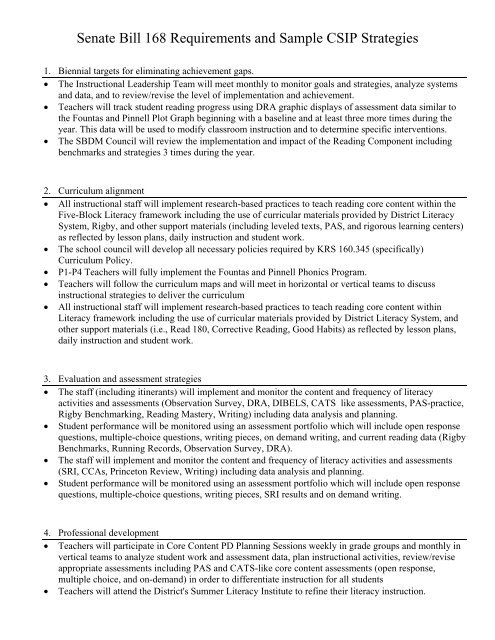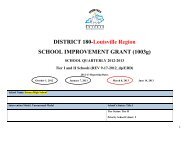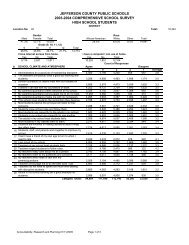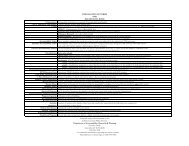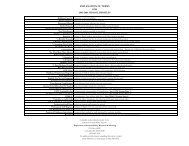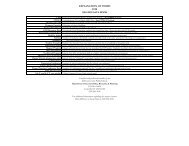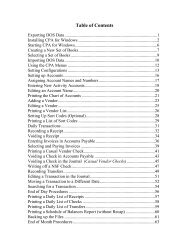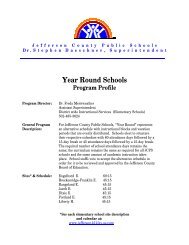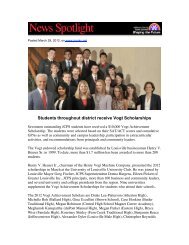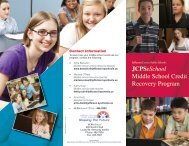CSIP Sample Strategies for SB168 Requirements
CSIP Sample Strategies for SB168 Requirements
CSIP Sample Strategies for SB168 Requirements
Create successful ePaper yourself
Turn your PDF publications into a flip-book with our unique Google optimized e-Paper software.
Senate Bill 168 <strong>Requirements</strong> and <strong>Sample</strong> <strong>CSIP</strong> <strong>Strategies</strong><br />
1. Biennial targets <strong>for</strong> eliminating achievement gaps.<br />
• The Instructional Leadership Team will meet monthly to monitor goals and strategies, analyze systems<br />
and data, and to review/revise the level of implementation and achievement.<br />
• Teachers will track student reading progress using DRA graphic displays of assessment data similar to<br />
the Fountas and Pinnell Plot Graph beginning with a baseline and at least three more times during the<br />
year. This data will be used to modify classroom instruction and to determine specific interventions.<br />
• The SBDM Council will review the implementation and impact of the Reading Component including<br />
benchmarks and strategies 3 times during the year.<br />
2. Curriculum alignment<br />
• All instructional staff will implement research-based practices to teach reading core content within the<br />
Five-Block Literacy framework including the use of curricular materials provided by District Literacy<br />
System, Rigby, and other support materials (including leveled texts, PAS, and rigorous learning centers)<br />
as reflected by lesson plans, daily instruction and student work.<br />
• The school council will develop all necessary policies required by KRS 160.345 (specifically)<br />
Curriculum Policy.<br />
• P1-P4 Teachers will fully implement the Fountas and Pinnell Phonics Program.<br />
• Teachers will follow the curriculum maps and will meet in horizontal or vertical teams to discuss<br />
instructional strategies to deliver the curriculum<br />
• All instructional staff will implement research-based practices to teach reading core content within<br />
Literacy framework including the use of curricular materials provided by District Literacy System, and<br />
other support materials (i.e., Read 180, Corrective Reading, Good Habits) as reflected by lesson plans,<br />
daily instruction and student work.<br />
3. Evaluation and assessment strategies<br />
• The staff (including itinerants) will implement and monitor the content and frequency of literacy<br />
activities and assessments (Observation Survey, DRA, DIBELS, CATS like assessments, PAS-practice,<br />
Rigby Benchmarking, Reading Mastery, Writing) including data analysis and planning.<br />
• Student per<strong>for</strong>mance will be monitored using an assessment portfolio which will include open response<br />
questions, multiple-choice questions, writing pieces, on demand writing, and current reading data (Rigby<br />
Benchmarks, Running Records, Observation Survey, DRA).<br />
• The staff will implement and monitor the content and frequency of literacy activities and assessments<br />
(SRI, CCAs, Princeton Review, Writing) including data analysis and planning.<br />
• Student per<strong>for</strong>mance will be monitored using an assessment portfolio which will include open response<br />
questions, multiple-choice questions, writing pieces, SRI results and on demand writing.<br />
4. Professional development<br />
• Teachers will participate in Core Content PD Planning Sessions weekly in grade groups and monthly in<br />
vertical teams to analyze student work and assessment data, plan instructional activities, review/revise<br />
appropriate assessments including PAS and CATS-like core content assessments (open response,<br />
multiple choice, and on-demand) in order to differentiate instruction <strong>for</strong> all students<br />
• Teachers will attend the District's Summer Literacy Institute to refine their literacy instruction.
• Teachers will continue to analyze student work and determine next steps <strong>for</strong> instruction to help students<br />
reach proficiency in all content areas during embedded professional development sessions.<br />
• Teachers will participate in weekly grade level department meetings <strong>for</strong> Core Content Planning.<br />
Monthly entire departments will meet to analyze student work and assessment data, plan instructional<br />
activities, and review/revise appropriate assessments.<br />
5. Parent communication and involvement strategies<br />
• The School Climate committee will implement a plan to recruit students and in<strong>for</strong>m families through<br />
activities such as orientations, open house, transition meetings <strong>for</strong> preschool and middle school,<br />
community/home visits, parent nights, newsletters, school web page, school tours, and career building.<br />
• The school will update school web page to in<strong>for</strong>m parents of school activities and events.<br />
• A Family Math night will be held to involve parents and students in the Math Curriculum.<br />
Transportation will be arranged as requested and childcare will be provided.<br />
• The school will host Kindergarten Round Up, New Student Orientation, and Middle School Night to<br />
address key transition points within and between schools <strong>for</strong> students, staff, and parents.<br />
• Preschool children and families will engage in a variety of collaborative activities ( i.e. a parent night,<br />
partnering with other classes, etc.)<br />
• The school will host Content Area Nights (literacy, math, science, and social studies); New Student<br />
Orientation, and High School Night to address key transition points within and between schools <strong>for</strong><br />
students, staff, and parents.<br />
6. Attendance improvement and drop-out prevention strategies<br />
• The attendance committee will implement and monitor the attendance plan involving collaboration with<br />
families and community services, and student incentives to promote regular attendance.<br />
• Students who have perfect attendance during each six week grading period will receive a free book paid<br />
through PTA funds.<br />
• The attendance committee will monitor the attendance of the Student Recovery students who have<br />
attendance problems at monthly meetings and contact any parent whose child has missed a day of<br />
school.<br />
• SRP funds will target students who are in danger of dropping out to engage them in clubs/athletics.<br />
• Every Wednesday will be Club Day. These clubs will cover a variety of activities (i.e., chess, walking,<br />
cheerleading, karate, student council, etc.). Being involved in extra-curricular activities has been shown<br />
to decrease the chances of dropping out.<br />
7. Technical assistance<br />
• The TLC will facilitate parent/teacher partnerships <strong>for</strong> targeted students and assist teachers in effective<br />
classroom management strategies, instructionally and socially.<br />
• School-wide literacy experiences will be promoted with a renewal of the RIF grant,<br />
availability of Quick Reads, Scholastic News and/or Time For Kids.<br />
• Two Reading Recovery Teachers (one funded by RTA; the other by Every One Reads) will continue to<br />
implement the JCPS Reading Recovery Model.<br />
• The behavior coach will facilitate parent/teacher partnerships <strong>for</strong> targeted students and assist teachers in<br />
effective classroom management strategies, instructionally and socially.<br />
• Teachers will incorporate the TIP computers in lessons daily.


